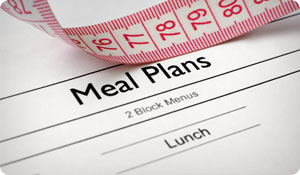
Trying to lose weight but can't? Before you blame it on this or that, it may be time to step back and take a good look at at your actions. Are you taking any of these missteps?
Following the Wrong Diet. There is no "one size fits all" diet, so you may not be doing yourself any favors by following a diet that is too low in calories, or the latest fad diet, unless it is somewhat in line with the way you normally eat or want to eat for the rest of your life. If you choose a diet that is too restrictive, or completely eliminates foods you really enjoy, there's little chance you'll stick to it. The diet that will work for you is one that you can live with, as well as one that helps you lose pounds and maintain a healthy weight once you get to it.
Dieting without Exercising. If you lose weight without exercising, you may lose pounds, but some of your loss may be lean muscle tissue, which is more metabolically active than fat, which means it's better at burning calories. So you don't want to lose it! Exercise not only helps you burn excess calories, it helps you build up lean muscle. Keep in mind that muscle weighs more than fat, so when you do develop more muscle, you may not lose as much weight or as quickly as you hoped. But the muscle weight you are carrying is far healthier and looks better than if you don't maintain that muscle and that always makes up for an extra couple of pounds. And according to at least one study, published by researchers at the University of Missouri-Columbia, exercise is also essential for preventing further weight gain, and keeping weight off once you lose It.
Too Much Exercise. There are two reasons why over-exercising may interfere with reaching your weight loss goals. Exercise makes you hungry and the more exercise you do, the hungrier you'll get and the more you are likely to eat at your next meal or snack. Overexercising also carries a "burnout" factor. You may start out motivated but you're more likely to give up before you reach your goals.
Losing Weight Too Slowly. Although slow to moderate weight loss is generally recommended for long-term success, people who are clinically obese may benefit more from greater initial weight loss. A University of Florida study of 262 middle-aged obese women countered this advice when researchers found that the women who experienced greater weight loss in the first month of dieting and exercising maintained their weight loss longer and were less likely to regain the lost weight than those women who lost weight more gradually. Women on the fast track were also five times more likely to reach their goal weight .
Dieting Alone. Most people need a support system when trying to make lifestyle changes. Enlist the help of a friend or family member, someone you can "report" to and, ideally, someone who also wants to lose weight and is willing to follow a similar diet and exercise program with you.
Sources:
Indiana University Nutrition Services. "Weight Control." Web. 13 Jan 2011
http://www.indiana.edu/~health/departments/healthandwellness/nutrition/weightcontrol.html
Southern Illinois University Department of Internal Medicine. "Weight Control." Web. 13 Jan 2011.
http://www.siumed.edu/medicine/gim/weight_control.htm
Amati, et al. "Separate and Combined Effects of Exercise Training and Weight Loss on Exercise Efficiency and Substrate Oxidation." Journal of Applied Physiology. 2008;105 (3): 825. Web. 13 Jan 2011.
http://jap.physiology.org/content/105/3/825
Martin, E. "Exercise Counters Negative Effects of Weight Regain." University of Missouri Wellness Program." Apr 2010. 13 Web. Jan 2011.
http://www.umsystem.edu/ums/curators/wellness/newsletters/0410NewsletterMU.pdf
http://www.sciencedaily.com/releases/2010/03/100302131717.htm
Nackers, LM, Ros, KM, Perri, MG. "The Association Between Rate of Initial Weight Loss and Long-Term Success in Obesity Treatment: Does Slow and Steady Win the Race?" International Journal of Behavioral Medicine. 2010. Web. 13 Jan 2011
http://www.springerlink.com/content/18l187465p6601k8/fulltext.html





